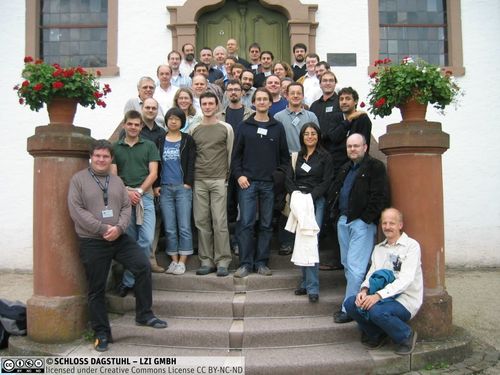Dagstuhl-Seminar 05371
Principles and Practices of Semantic Web Reasoning
( 11. Sep – 16. Sep, 2005 )
Permalink
Organisatoren
- François Bry (LMU München, DE)
- François Fages (INRIA - Le Chesnay, FR)
- Massimo Marchiori (MIT - Cambridge, US)
- Hans-Jürgen Ohlbach (LMU München, DE)
Kontakt
Externe Veranstaltungsseite
Presse/News
Press Release
Wie Computer neues Wissen erschließen (Pressemitteilung vom 06.09.2005)
François Fages, Sylvain Soliman (eds); Principles and Practice of Semantic Web Reasoning, Third International Workshop, PPSWR 2005, Dagstuhl Castle, Germany, September 11-16, 2005, Proceedings. Lecture Notes in Computer Science 3703, Springer 2005, ISBN 3-540-28793-0DOI: 10.1007/11552222
The seminar "Principles and Practice of Semantic Web Reasoning" took place from September 11-16, 2005. It was organised by F. Bry (Univ. München, DE), F. Fages (INRIA Rocquencourt, FR), M. Marchiori (MIT - Cambridge, US) and H. J. Ohlbach (Univ. München, DE). The seminar was a forum for discussing various forms of reasoning that are or can be used on the Semantic Web. Moreover, it addressed both reasoning methods for the Semantic Web and Semantic Web applications relying upon various forms of reasoning.
The seminar was attended by 50 researchers that work in the area of "Reasoning on the Web". 29 of these participants are members of the European Network of Excellence REWERSE ("Reasoning on the Web with Rules and Semantics") that is funded by the EC and Switzerland. REWERSE is a leading project in the area of rule-based reasoning and applications for the Semantic Web. REWERSE started on March 1, 2004 and is scheduled for four years (cf. http://rewerse.net).
The technical program of the Dagstuhl seminar consisted of talks, tutorials, panel discussions, demo sessions and general discussion sessions.
Emerging research topics from the seminar
While the presented talks, demos and tutorials showed significant progress in various specific research areas of "Reasoning on the Web" in particular the seminar panels and discussions revealed a number of challenges for the current research on rules and reasoning for the Semantic Web. Some of the addressed challenges were:
- Rules need well-defined semantics
- Rules necessary for making ontologies inter-operable
- Semantic Web requires general high-level rule languages
- Relevance of Rule Interchange Languages
- Concrete foundational research issues
- Viewpoints on Rule Languages
- Truth on the Web is "context-dependent"
- Semantic Web community has to be aware of previous research
- Scalability of reasoning in a completely decentralized setting
- Trends towards mainstreaming of rules
- Central role of use cases
- Start with simple but relevant use cases
General Conclusions from the Seminar
General conclusions from the seminar are very positive. The seminar contained very good presentations also by young researchers, had very lively and fundamental discussions profiting from the contributions of senior researchers, fostered the co-operation between different communities working in the area of "Reasoning on the Web with Rules and Semantics" and showed the relevance of for further meetings and workshops of this type. In particular, showcasing the relevance for practical applications was frequently commented as a central task for the coming months.
- Philippe Adjiman (University of Paris South XI, FR)
- Ricardo Amador (Universidade Nova de Lisboa, PT)
- Grigoris Antoniou (FORTH - Heraklion, GR) [dblp]
- Rolf Backofen (Universität Jena, DE) [dblp]
- Erik Behrends (Universität Göttingen, DE)
- Sacha Berger (LMU München, DE)
- Harold Boley (University of New Brunswick at Fredericton, CA) [dblp]
- Emmanuel Coquery (INRIA - Le Chesnay, FR)
- Stefan Decker (National University of Ireland - Galway, IE) [dblp]
- Wlodzimierz Drabent (Polish Academy of Sciences - Warsaw, PL)
- Michael Eckert (LMU München, DE)
- François Fages (INRIA - Le Chesnay, FR) [dblp]
- Enrico Franconi (Free University of Bozen-Bolzano, IT) [dblp]
- Oliver Fritzen (Universität Göttingen, DE)
- Tim Furche (LMU München, DE)
- Fausto Giunchiglia (Università di Trento, IT)
- Adrian Giurca (BTU Cottbus, DE)
- Jakob Henriksson (TU Dresden, DE)
- Nicola Henze (Leibniz Universität Hannover, DE)
- Pascal Hitzler (KIT - Karlsruher Institut für Technologie, DE) [dblp]
- Thomas Hornung (Universität Freiburg, DE)
- Geert-Jan Houben (TU Eindhoven, NL) [dblp]
- Christoph Koch (TU Wien, AT) [dblp]
- Alexander Kozlenkov (City University - London, GB) [dblp]
- Francois Laburthe (BOUYGUES St. Quentin, FR)
- Patrick Lambrix (Linköping University, SE)
- Georg Lausen (Universität Freiburg, DE)
- Francesca Alessandra Lisi (University of Bari, IT) [dblp]
- Jan Maluszynski (Linköping University, SE)
- Wolfgang May (Universität Göttingen, DE)
- Hans-Jürgen Ohlbach (LMU München, DE)
- Daniel Olmedilla (Leibniz Universität Hannover, DE)
- Peter F. Patel-Schneider (Bell Labs - Murray Hill, US)
- Riccardo Rosati (Sapienza University of Rome, IT)
- Marie-Christine Rousset (Université Paris Sud, FR)
- Stefan Schlobach (VU University Amsterdam, NL) [dblp]
- Lars Schmidt-Thieme (Universität Freiburg, DE) [dblp]
- Klaus U. Schulz (LMU München, DE)
- Uta Schwertel (LMU München, DE)
- Dietmar Seipel (Universität Würzburg, DE)
- Wolf Siberski (Leibniz Universität Hannover, DE)
- Florian Sohler (LMU München, DE)
- Stefanie Spranger (LMU München, DE)
- He Tan (Linköping University, SE)
- Sergio Tessaris (Free University of Bozen-Bolzano, IT)
- Holger Wache (VU University Amsterdam, NL)
- Gerd Wagner (BTU Cottbus, DE)
- Felix Weigel (LMU München, DE)
- Artur Wilk (Linköping University, SE)
- Sebastian Will (Universität Jena, DE) [dblp]


